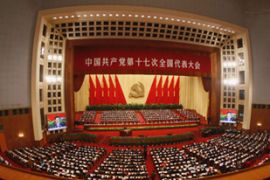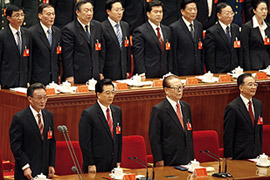Hu sets vision for China’s future
President opens key congress by urging party to combat graft and narrow wealth gap.

Tackling corruption
| The 17th Congress |
|
|
But he warned that the biggest threat to China’s stability was corruption, which he said could undermine the party’s grip on power and would not be tolerated.
Hu offered to enter into negotiations with Taiwan towards a peace agreement in an overture to the self-ruled island which China sees as a renegade province.
No military threat
|
Your Views |
|
“The 17th congress brings together more than 2,000 delegates from across China to evaluate the country’s progress over the past five years” |
Unlike his predecessors, Hu did not threaten to take Taiwan back by force, but he warned the island against formally declaring independence.
“China‘s sovereignty and territorial integrity brook no division, and any matter in this regard must be decided by the entire Chinese people, including our Taiwan compatriots,” he said.
“China will never allow anyone to separate Taiwan from the motherland in any name or by any means,” he said in apparent reference to a plan by Chen Shui-bian, Taiwan‘s president, to hold a referendum on seeking UN membership under the name Taiwan.
Taiwan’s government had previously sought membership under the name Republic of China.
Hu promised policies that would benefit the island and protect the huge investments by Taiwan firms in China. He also called for a resumption of direct trade, travel and mail links.
“We would like to talk about everything. Our consistent position is to talk without any preconditions … We want to wait to see more. [Hu’s] actions speak louder than words,” he told Reuters.
| Key party congresses |
|
1st congress. 1921 – 13 delegates including Mao Zedong meet in secret in Shanghai to formally approve aims and charter of the Communist Party of China
7th congress. 1945 – Meeting in communist forces’ stronghold of Yan’an names Mao as undisputed leader and enshrines his “thought” as party ideology
9th congress. 1969 – Meeting in Beijing at height of Cultural Revolution sees more than 80 per cent of elite central committee fired from posts
12th congress. 1982 – Deng Xiaoping advocates “socialism with Chinese characteristics”, shifting focus from central planning to free market capitalism
16th congress. 2002 – Hu Jintao succeeds Jiang Zemin as party leader, beginning first smooth leadership change since 1949 revolution. But Jiang leaves allies in key leadership posts |
It is expected to see several days of backroom political manoeuvring as Hu moves to stamp his authority on the party and cement his leadership of the country.
 |
| The congress may give an indication of who will next lead China [Reuters] |
“We must uphold the party’s role as the core of leadership in directing the overall situation,” Hu said, signalling that while limited political reform would continue, the party had no intention of loosening its grip on power.

